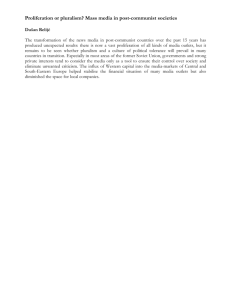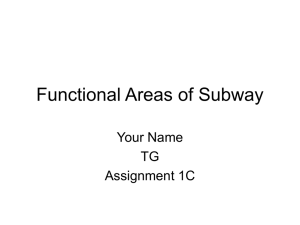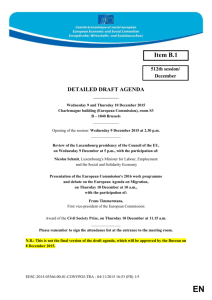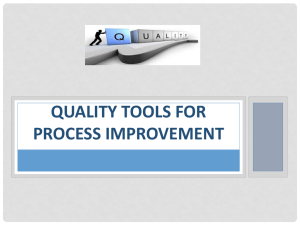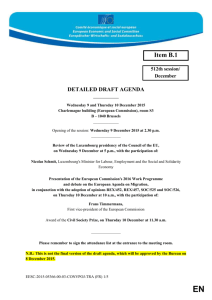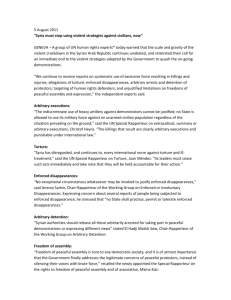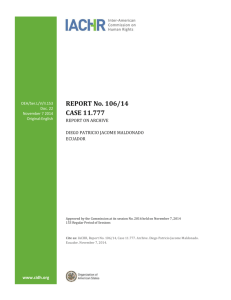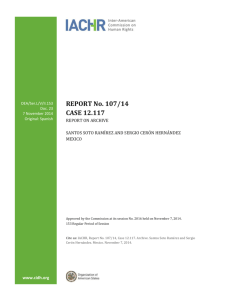here - Organization of American States
advertisement
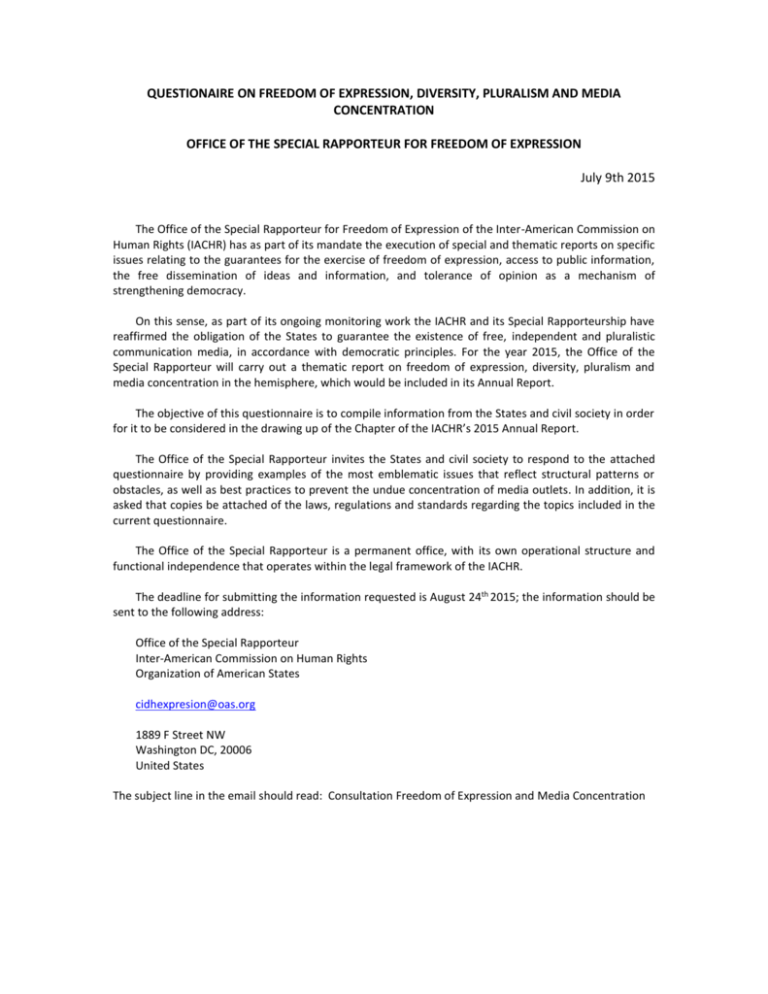
QUESTIONAIRE ON FREEDOM OF EXPRESSION, DIVERSITY, PLURALISM AND MEDIA CONCENTRATION OFFICE OF THE SPECIAL RAPPORTEUR FOR FREEDOM OF EXPRESSION July 9th 2015 The Office of the Special Rapporteur for Freedom of Expression of the Inter-American Commission on Human Rights (IACHR) has as part of its mandate the execution of special and thematic reports on specific issues relating to the guarantees for the exercise of freedom of expression, access to public information, the free dissemination of ideas and information, and tolerance of opinion as a mechanism of strengthening democracy. On this sense, as part of its ongoing monitoring work the IACHR and its Special Rapporteurship have reaffirmed the obligation of the States to guarantee the existence of free, independent and pluralistic communication media, in accordance with democratic principles. For the year 2015, the Office of the Special Rapporteur will carry out a thematic report on freedom of expression, diversity, pluralism and media concentration in the hemisphere, which would be included in its Annual Report. The objective of this questionnaire is to compile information from the States and civil society in order for it to be considered in the drawing up of the Chapter of the IACHR’s 2015 Annual Report. The Office of the Special Rapporteur invites the States and civil society to respond to the attached questionnaire by providing examples of the most emblematic issues that reflect structural patterns or obstacles, as well as best practices to prevent the undue concentration of media outlets. In addition, it is asked that copies be attached of the laws, regulations and standards regarding the topics included in the current questionnaire. The Office of the Special Rapporteur is a permanent office, with its own operational structure and functional independence that operates within the legal framework of the IACHR. The deadline for submitting the information requested is August 24th 2015; the information should be sent to the following address: Office of the Special Rapporteur Inter-American Commission on Human Rights Organization of American States cidhexpresion@oas.org 1889 F Street NW Washington DC, 20006 United States The subject line in the email should read: Consultation Freedom of Expression and Media Concentration Questionnaire: 1. What is the legislation that regulates the requirements, procedures and conditions for access, allocation and use of media outlets in your country, particularly in the following areas? a. Open TV (analogue and digital) both for commercial, public and community media. b. Pay Television or by subscription or for subscribers in their different transmission systems (satellite, cable, terrestrial waves, MMDS/LMDS, IPTV). c. Radio broadcasting (analogue and digital) both for commercial, public and community media. d. Written press. Explain the requirements established by the legislation in order to establish and publish print media (paper version and/or digital). Please indicate them by attaching the legislation or indicating the website link. 2. The legislation outlined includes specific provisions to define, limit or prevent the concentration of the media (in radio, television, and other audio-visual media services or in relation to convergence)? In particular if provisions exist with: a. Limits on the multiplicity of licenses and/or the use of radio frequency spectrum under the control of a same natural or legal person and/or a same economic group. b. Limits to cross-ownership (inside and outside of the vertical or horizontal sector). c. Limits to audience and potential markets. d. General antitrust laws which are applicable to media outlets. Please, describe accurately the passive subjects of this regulation (natural and legal persons, economic groups, etc.) Please indicate them by attaching the rules (laws, regulations or other rules) or indicate its website link. 3. What institutions or administrative bodies of your country are competent regarding media concentration and/or defence of its competition? a. Bodies that regulate the media in general. b. Bodies that regulate the radio, the TV and audio-visual media services. c. Bodies that regulate telecommunications, including audio-visual services. d. Anti-trust agencies (indicate whether they act in an exclusive or complementary manner to the specific regulation of the media.) Please indicate the agencies and their characteristics, skills functions and rules. Also indicate the link to access the institutional website. 4. What types of regulatory decisions have been implemented in your country to guarantee the diversity and pluralism of the media and prevent or limit its undue concentration? a. Is there some kind of administrative process that exists in your country to apply rules / decisions / antitrust provisions or to reduce the concentration in the field of the media? b. Have legislative or administrative decisions been adopted in your country in the framework of the transition of analogue television to digital television to entitle of greater pluralism and diversity to the media system? c. Have decisions been adopted in your country to prevent the greater concentration of the media in: licitation or calls to those interested in offering broadcasting services to provide new licenses; or before the existence of media acquisition processes (purchases, mergers, etc.)? Please indicate by attaching the rules (laws, regulations or other rules) or by indicating the website link. 5. How do you evaluate the impact of the implementation of the legislation and the decisions of regulatory bodies? 6. How do you guarantee in your country the right of society to know who controls the media? a. b. c. d. Does specific legislation and practices exist to ensure transparency and access to information on the ownership and control of media? Do norms exist that require the media to publish and display to the public who or whom are the owners, holders and/or control the companied behind the media outlets? Governmental bodies that regulate the media system publish and update the information on ownership, control, allocation and transfer of media outlets? Can leaders in elected positions in office own media outlets in your country or do they have any limitations? Please indicate the bodies that regulate the transparency of the media outlets, their competitions, functions and their rule. Also indicate the link to access the institutional website. 7. Are there any law that recognize and effectively include community media in the various media systems? a. Laws that recognize community media and establish reserves to include the community sector. b. Licitation and/or frequency assignment process and/or licenses directed specially to the community sector. c. Special public policies for public service media. Could you send information regarding these policies and their implementation? 8. Is there any legal provision to effectively promote and include the public service media in the different media systems? a. Laws on public service media that regulate, especially regarding its governance. b. Designation of authorities and public participation mechanisms in this process. c. Mechanisms for transparency and accountability in the management of public resources. d. Special public policies promoting specific means of the media public sector. Could you send information regarding those policies the mentioned politics and its application? 9. Are there decisions of the courts of your country or administrative bodies, in relation to the concentration and diversity of media outlets? a. On constitutional matters. b. On other legal or regulatory issues. c. Other decisions made by administrative bodies (anti-trust agencies etc.) Please indicate, attaching the decisions or indicating your website link. 10. Are reports or studies in relation to concentration, diversity, and competition in the media sector available in your country? In particular: a. Studies and official reports (government or regulatory or sectorial bodies). b. Studies and reports from Universities. c. Studies or reports from the business sector or civil society. d. Do you have updated data from the market and property situation in the communication sector of your country? Please, provide a list of these reports or investigations, and attach them if possible. It would be very useful to count with information that refers to 2013 and 2014, as well as it evolution over the years. 11. Do you want to add any additional information or comment regarding the subject of this questionnaire? Thank you for your time and collaboration.
